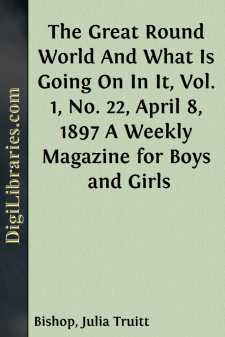Categories
- Antiques & Collectibles 13
- Architecture 36
- Art 48
- Bibles 22
- Biography & Autobiography 813
- Body, Mind & Spirit 142
- Business & Economics 28
- Children's Books 17
- Children's Fiction 14
- Computers 4
- Cooking 94
- Crafts & Hobbies 4
- Drama 346
- Education 46
- Family & Relationships 57
- Fiction 11829
- Games 19
- Gardening 17
- Health & Fitness 34
- History 1377
- House & Home 1
- Humor 147
- Juvenile Fiction 1873
- Juvenile Nonfiction 202
- Language Arts & Disciplines 88
- Law 16
- Literary Collections 686
- Literary Criticism 179
- Mathematics 13
- Medical 41
- Music 40
- Nature 179
- Non-Classifiable 1768
- Performing Arts 7
- Periodicals 1453
- Philosophy 64
- Photography 2
- Poetry 896
- Political Science 203
- Psychology 42
- Reference 154
- Religion 513
- Science 126
- Self-Help 84
- Social Science 81
- Sports & Recreation 34
- Study Aids 3
- Technology & Engineering 59
- Transportation 23
- Travel 463
- True Crime 29
Sort by:
by:
Kuno Francke
THE LIFE OF SCHILLER BY CALVIN THOMAS, LL.D. Professor of Germanic Languages and Literatures, Columbia University He kept the faith. The ardent poet-soul, Once thrilled to madness by the fiery gleam Of Freedom glimpsed afar in youthful dream, Henceforth was true as needle to the pole. The vision he had caught remained the goal Of manhood's aspiration and the theme Of those...
more...
THE ALL-IN-ONE Down through the Bad Lands the Little Missouri comes in long windings, white, from a distance, as a frozen river between the ash-gray hills. At its margin there are willows; on the small forelands, which flood in June when the mountain waters are released, cottonwoods grow, leaning toward the southwest like captives straining in their bonds, yearning in their way for the sun and winds of...
more...
The President has sent his first message to Congress. In it he says that he is very sorry to call an extra session of Congress, but he feels it his duty to do so, because he finds the money affairs of the country in a very bad condition, and thinks it is necessary for Congress to take some immediate steps to find a remedy. It would seem that since June, 1893, the yearly, and even the monthly, expenses...
more...
by:
Erskine Childers
INTRODUCTION My purpose in this volume is to advocate a definite scheme of self-government for Ireland. That task necessarily involves an historical as well as a constructive argument. It would be truer, perhaps, to say that the greater part of the constructive case for Home Rule must necessarily be historical. To postulate a vague acceptance of the principle of Home Rule, and to proceed at once to the...
more...
by:
Sidney Lee
PREFACE This work is based on the article on Shakespeare which I contributed last year to the fifty-first volume of the ‘Dictionary of National Biography.’ But the changes and additions which the article has undergone during my revision of it for separate publication are so numerous as to give the book a title to be regarded as an independent venture. In its general aims, however, the present...
more...
PREFACE. The site now occupied by the two cities of New York and Brooklyn, and over which they continue to spread, is pre-eminently "Revolutionary soil." Very few of our historic places are more closely associated with the actual scenes of that struggle. As at Boston in 1775, so here in 1776, we had the war at our doors and all about us. In what is now the heart of Brooklyn Revolutionary...
more...
CHAPTER I THE OUTBREAK OF WAR Unfair disparagement of the War Office during the war — Difficulties under which it suffered owing to pre-war misconduct of the Government — The army prepared, the Government and the country unprepared — My visit to German districts on the Belgian and Luxemburg frontiers in June 1914 — The German railway preparations — The plan of the Great General Staff...
more...
by:
Dillon Wallace
CHAPTER I DOCTOR JOE, SCOUTMASTER "Doctor Joe! Doctor Joe's comin'! He just turned the p'int!" Jamie Angus burst into the cabin at The Jug breathlessly shouting this joyful news, and then rushed out again with David and Andy at his heels. "Oh, Doctor Joe! It can't be Doctor Joe, now! Can it, Pop? It must be some one else Jamie sees! It can't be Doctor Joe,...
more...
PALESTRINA.I.The Netherlands share other glories than that of having nursed the most indomitable spirit of liberty known to mediteval Europe. The fine as well as the industrial arts found among this remarkable people, distinguished by Erasmus as possessed of the patientia laboris, an eager and passionate culture. The early contributions of the Low Countries to the growth of the pictorial art are well...
more...
CHAPTER I It was Mr. Ricardo's habit as soon as the second week of August came round to travel to Aix-les-Bains, in Savoy, where for five or six weeks he lived pleasantly. He pretended to take the waters in the morning, he went for a ride in his motor-car in the afternoon, he dined at the Cercle in the evening, and spent an hour or two afterwards in the baccarat-rooms at the Villa des Fleurs. An...
more...











